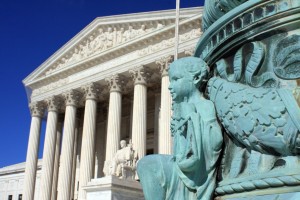
**The Supreme Court’s 2015 Term Opens With a Series of Cases Important for Consumer Class Action Defendants: Campbell-Ewald v Gomez, Spokeo v Robins and Tyson Foods v Bouaphakeo** . . .
By: Brent E. Johnson
In recent years, the Supreme Court has handed down victories to the class action defense bar. In Wal-Mart v. Dukes, 564 U.S. ___ (2011), the Court reversed a California district court certification of a gender discrimination class – raising the bar on commonality questions for plaintiffs. In Comcast v. Behrend, 569 U.S. __ (2013), the Court again reversed a district court certification – heightening scrutiny on plaintiffs’ methods for alleging class wide damages. As the 2015 term opens this week, defense counsel around the country eye further potential victories in three key cases.
The first case up is Campbell-Ewald Co. v. Gomez (No. 14-857) on appeal from the Ninth Circuit where the Court will deal with two frequently litigated questions as yet unresolved by the circuits. Namely, does a Rule 68 offer of complete relief to a plaintiff moot his or her claim and, if so, does it also moot the resulting class claim under Rule 23? The underlying case concerns unsolicited text messages prohibited by the Telephone Consumer Protection Act (TCPA) 47 U.S.C. § 227. The TCPA contains a statutory remedy and defendants argued that, to the extent they had offered Plaintiff the full amount of the statutory remedy (per Rule 68) as relief, the plaintiff suffered no cognizable Article III damages. Thus, defendants argue that because the plaintiff suffered no injury, he has no right to represent a class of people who may have been damaged. From a practical perspective, the case addresses the question: Can a defendant “pick off” would be class representatives through Rule 68 offers of judgment thereby destroying the foundation of the class action claim? As anyone who has defended corporations receiving required pre-litigation notices under consumer protection statutes has observed, plaintiff law firms have become increasingly reticent to disclose the identity of their clients at the notice stage in order to forestall Rule 68 offers of judgment until the putative class action lawsuit has been filed.
The second case is Spokeo Inc. v. Robins, (No. 13-1339) also on appeal from the Ninth Circuit. This case involves a related question of Article III standing for class representatives. Spokeo concerns the Fair Credit Reporting Act, 15 U.S.C. § 1681 (FCRA), which requires consumer credit agencies to take reasonable steps to ensure the accuracy of their published reports. Plaintiff in a putative class action argued in the Central District of California that results for his name on the Spokeo website contained inaccurate information about plaintiff’s education and professional experience – and that this inaccuracy harmed his employment prospects. The District Court dismissed, finding that the alleged damages – based on hypothetical impact on his employment – were too speculative to satisfy Article III standing. The Ninth Circuit reversed, holding that the statutory violation implicitly creates a private cause of action to enforce and that this violation of a statutory right was an “injury” sufficient to confer standing. The Ninth Circuit Spokeo decision was the latest in a circuit split – on one side the Second and Fourth circuits, which have rejected standing arguments from plaintiffs who alleged bare statutory violations that did not result in any actual harm (Kendall v. Emps. Ret. Plan of Avon Prods., 561 F.3d 112 (2d Cir. 2009); David v. Alphin, 704 F.3d 327 (4th Cir. 2013)); and the Ninth Circuit joining the Sixth and Seventh Circuits, which have come out on the side of recognizing “damages” for private plaintiffs with respect to minor statutory violations. Beaudry v. TeleCheck Servs, 579 F.3d 702 (6th Cir. 2009); Murray v. GMAC Mortg. Corp., 434 F.3d 948 (7th Cir, 2006). If the Supreme Court recognizes damages irrespective of actual harm, the impact could be felt more broadly than FCRA – there are numerous similar statutory schemes, including truth-in-lending legislation (15 U.S.C. § 1640(a)); debt collection statutes, (15 U.S.C. § 1692k(a)); as well as various privacy laws (18 U.S.C. § 2710(c)(1); 47 U.S.C. § 551(f)(1)-(2)).
The third case is Tyson Foods v. Bouaphakeo (No. 14-1146) – a challenge to a $5.8 million wage-and-hour judgment in favor of a class of employees at Tyson’s meat packing plant in Iowa. Tyson’s petition seeks a reversal of the district court and Eight Circuit’s decision to permit liability and damages verdicts to be based – not on an individual analysis of each purported class member – but by extrapolating a statistical average across the board based on the discrepancies observed in a sample class of workers’ hours and pay. Tyson further appeals on the lack of ascertainability of the class itself – that is, that the certified group (even according to the Plaintiffs’ own expert) included a significant number of people who weren’t underpaid at all. If successful, the Tyson case will build upon the Court’s disapproval in Wal-Mart of “trial by formula” and provide a significant bulwark against plaintiffs in putative class actions glossing over differences amongst their claimed class in order to achieve certification.
Not surprisingly, this trifecta of cases has generated a significant amount of interest, amicus briefing, and optimistic thinking from the defense bar that momentum is on its side. The implications are not insubstantial if defendants prevail: the type of de facto strict liability for statutory compliance created by such class actions will diminish, there will be new avenues to derail cases pre-certification, and the barrier of ascertainable and reliable class wide damages that plaintiff s must hurdle will be reinforced.
